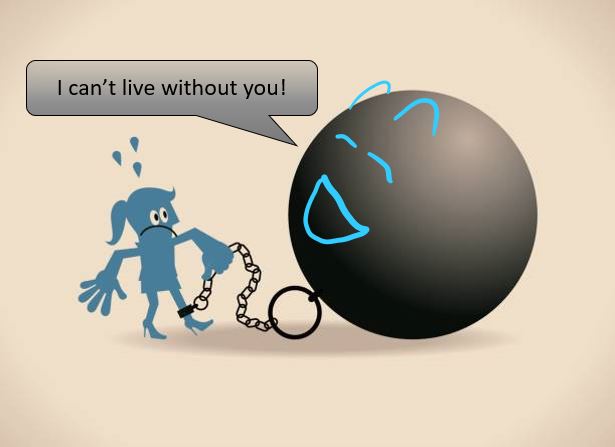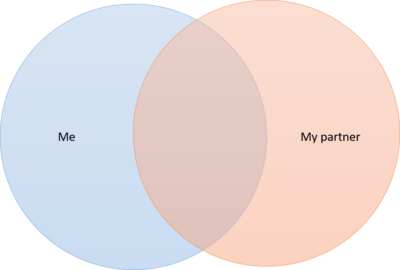This article follows up on My few words about Unconditional Love
Now, if you have an idea what I mean by Unconditional Love, I would like to pay a special attention to how it can be applied in a relationship with your primary partner. As always, I will use they, so I don’t need to constantly write he/she.
The long story short: there are absolutely no differences between how you approach your lover and anybody else. “Wait what?” Yep. But to explain that more clearly, I will need to go much deeper.
In my previous article I explained that Unconditional Love is to truly accept and respect other people no matter on how much their opinions align with yours. And there is no reason why you should treat your partner differently. And now the secret is that you shouldn’t treat yourself in a different way either!
Old paradigm “love”
The old view of “partnership” is that you take one person as a half, second person as the complementary half and together they form one whole. Does anybody sense what is not alright on this idea?
Of course! It creates a huge dependency and dangerous addiction to the other person. You can also translate it as “You are never good enough on you own. You need somebody else in order to feel whole and happy. And if you make mutually each other happy all the time, then you live happily ever after.” This statements really chills my spine. Suddenly, your happiness and worthiness becomes completely dependent on a free will of somebody else!
No wonder that we are so terrified of our partner leaving us! In fact this is all what jealousy is about – it is a fear of not being good enough on our own, so when the other person leaves us, we would feel incomplete.
Sex is a nice demonstration of how this backfires. Let’s say that you need your partner to have sex with you (to make you feel happy/worthy/appreciated/loved … whatever).
- If they don’t do you a favor, you don’t feel happy and they feel guilty/unhappy that you feel unhappy with them.
- This can also generate feelings of not being good enough as the person cannot “satisfy” you.
- If they do you a favor over and over, you may become addicted to their favors.
- And what will happen if they suddenly realize that they actually don’t like doing you the favor over and over?
- If they do you the favor nevertheless, in addition to the unhappiness from point 1. they will also feel even more unhappy as they are not true to themselves and and they are crossing their boundaries. They might also develop a strong resistance towards the particular favor in general, if they keep crossing their boundaries long-term.
Notice how many negative feelings are involved in this approach, no matter what you choose!
Another famous saying is: “I can’t live without you! My life is meaningless without you!” You can hear this one in romantic movies over and over. And for some reason people think that this is what real love looks like. No way! This is more like something what drug-addicted people would say when they can’t have their dose 😀 If you told something like this to somebody from the native tribes, they would interpret this statement as “I will be like an iron ball shackle chained to your leg. You’ll never get rid of me.”
Take your power back!
We usually forget the most important relationship from all – the relationship with ourselves. Yet this relationship is omnipresent and determines the quality of any other relationship. If you are in a victim mode you will approach others significantly differently than when you are in the right relationship with yourself, firmly hold your power, know your values and are pretty much the eye of the hurricane – very peaceful.
Most of us were led to put others on the first place and suppress our own feelings and opinions. Even our school system isn’t very supportive of our unique personalities. We are expected to fit in. Yet this is so disempowering!
Therefore, based on my experience, it is critical to start paying attention to ourselves again.
I do understand what everybody else wants me to do, become, think or feel.
Yet what do I want? What do I feel? What does resonate with me more? What am I good at?
What is optimal for me given my own experience, my own conditions, my own environment, my own talents, my own visions and desires at each now moment?
Every time when you find yourself in a situation that somebody else needs to do, think or feel something in order for you to be happy, you are giving your power away! Don’t do that. Let them have their own experience which works for them and you choose your own which will work for you.
This is the difference between the old paradigm and the new paradigm. In the old paradigm, you would be asked to satisfy others first – kind of spill your glass to make other glasses more full. This typically drains people and it is one of the reasons why there is so much sickness in the world. The idea that I’m not good/powerful enough is also a reason why there is so much dominance and violence in the world. Because if you believe that you are powerful enough, you don’t need to hurt others to prove yourself anything.
When we claim our power back and put ourselves on the first place, we suddenly realize that we don’t need others to feel good. And the more we are our true selves, the more we allow our passion and joy to overflow. And it is in this state of overflowing when we feel fulfilled as well as become much more effective in helping others too.
New paradigm love – Equanimity, yet you on the first place
I cannot emphasize this enough. You don’t need others for you to be happy! And you don’t need others to be or do the same as you either. You already have everything you need:
- be true to yourself
- follow your passion and do the things you love every day
- consciously choose to interpret situations in a positive way
There is nobody else in that equation. The process is from inside – out. Nobody can block a transformation from within except you! And we all have the same inner resources if we choose to access them, no matter on our background or history.
Divine to divine partnership
Here’s a different picture which demonstrates what a divine to divine partnership typically looks like:
As you can see, there are 2 individuals who are already complete and who share their life with each other without any unhealthy attachment, dependency or addiction. They love themselves unconditionally and therefore it is easy for them to love their partner unconditionally too.
They are not together because it is expected by somebody else or because they would need to fill in a hole within them. They are together because they both feel that it is beneficial to walk alongside each other at this time given current circumstances and their current values and needs. And they both understand that any of the underlying conditions can change at any time in the future.
Please, be true to yourself and put yourself on the first place while respecting and fully accepting that the other person will do the same.
It is not about looking for compromises either. “Compromise” means that neither of the sides is actually fully satisfied. It is about partnership – equal to equal – what works for both of you at the same time. It is about working with core values of both people and make the best out of it.
Relationship is not a prison
Yo never can “own” anybody. Therefore even if you are married, it doesn’t give you right to approach your partner as your property nor can you be approached this way. I will write a separate article just on this topic in the future as there is a lot to cover here and I can offer my personal experience and insights from Yeshua (the ascended master who was incarnated as Jesus ~2000 years ago) 🙂
The advantage of being full and independent on your partner means that if your partner needs to have any experience which is against your values, it is not that dramatic for you to let them go. And vice versa, when you need some experience which your current partner cannot give you without sacrificing their values, you can ask to give each other space to find somebody else again.
Preventing somebody to follow their heart and passion just because you don’t want to end up being alone or because it would look bad to the rest of your family defeats the idea of unconditional love.
The unconditional love in a healthy relationship is more like the (healthy) one between parents and their children. They love them deeply but once the children express a desire from their heart, they give them the freedom to follow it.
Leading by example
Often, we choose to live by expectations of others in order to not be ostracized, to not “betray” our family or for other similar reasons. However, if you understand that if everybody is limited by the same expectations, it is pretty much a prison for the entire community. And in the end, nobody does what their heart desires most of the time.
Remember that the unconditional love starts with love for yourself first! If you love yourself enough, you don’t allow anybody to step on your core values. Not even your family. And if they can’t love you the way you are, their love is hardly unconditional either and therefore nothing worth being attached to anyway.
I admit that it takes a lot of courage to be willing to break the chain of traditions and show others that it can be done better.
Yet trust me that if you lead by example, others will follow! They will feel how happy you have become and it will be like a magnet for them. If they see that being true to yourself works for you, it can inspire them and give them courage to become true to themselves too.
So I invite you to become a bright star which illuminates the self-loving way for others. Although, please don’t forget to allow them to choose to follow or not the same way as you can choose whom to follow or not.
Namasté.
Bonus resources
Here’s a nice video (3:52 min) by Esther Hicks who channels “The Infinite Intelligence” which calls themselves “Abrahams” and in which they explain how our priorities in our relationship are wired in a sort of impossible way:
And in this video (13:53 min) they elaborate on the idea that putting ourselves on the first place might be considered as “selfish”. Note that they use the phrase “being in your vortex” which I would translate into a common English as “being aligned with your true self”:
The part that I would like to particularly highlight from this video is:
People say “Oh, you’re so selfish. You’re pleasing you!” And what they mean is “You should please me!?” You are selfish because you please you and I am not selfish because I think that you should please me instead of you? There is some screwy reasoning going on.




